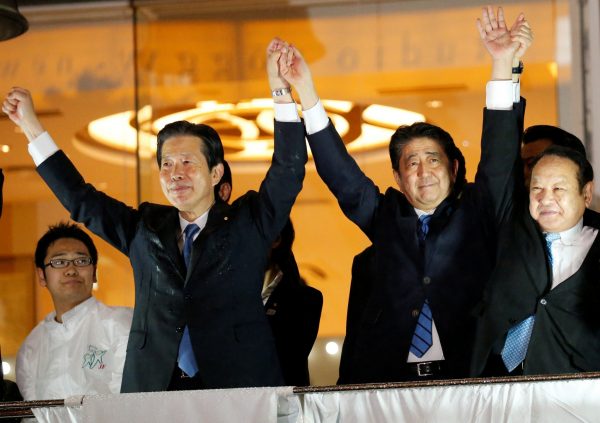Abe has justified the early dissolution on his need to ask the people to endorse his handling of the North Korea problem and his plan to divert some of the funds generated by the planned consumption tax rise in 2019 into education including free childcare. But it has been more accurately described as ‘a dissolution without a cause’. The consumption tax hike, for example, is more than two years away.
For Abe, the urgency was created by the three scheduled by-elections for lower house seats in October in which he feared a possible repeat of the anti-Liberal Democratic Party (LDP) protest vote that undid the party’s performance in the July Tokyo Metropolitan Assembly election. Abe’s leadership of the LDP may not have survived another electoral disaster of similar proportions.
Another important consideration was Abe’s desire to avoid questioning from opposition politicians on alleged influence-peddling that saw his support rates plummet earlier in the year. By September, the cabinet support rate had recovered sufficiently to present reasonably good prospects for the LDP in a general election. Furthermore, calling an early election is a strategy that has served Abe well in the past — such as in December 2014.
This makes the forthcoming election all about Abe and consolidating his power, not about the LDP and certainly not about the broader national interest. His announcement of the election capped off his latest round of overseas trips, including an address to the UN and another meeting with US President Donald Trump with Abe ‘the statesman’ on full display — a tactic that he has used before to raise support levels.
Abe was also proceeding on the basis of continuing disarray among opposition parties — including a series of defections from the Democratic Party (DP) — and the apparent inability of these parties to agree on electoral cooperation in order to defeat LDP candidates in marginal electorates.
The lack of a credible and electable alternative to the LDP up until now makes the sudden appearance of Tokyo Governor Yuriko Koike’s new ‘Party of Hope’ all the more striking. Developments around the October election have become much more dynamic and have the potential to dramatically change Japan’s party politics.
The Party of Hope now provides a lightning rod for voters disaffected with Abe to cast a protest vote against the LDP without going so far as voting for one of the traditional opposition parties. It is already acting as a magnet for defectors from the DP and LDP in the Diet and those wandering from one party to another purely for electoral advantage.
Koike’s new party has also opened up opportunities for electoral cooperation with the DP, especially under the new leadership of the more centrist Seiji Maehara. He has made a radical proposal for DP candidates to run on the Party of Hope ticket in the election, which would effectively merge the two groups. Maehara himself would run as an independent signifying his abandonment of the DP label. The addition of DP candidates to those running for the Party of Hope will mount a potentially even more serious challenge to the LDP across a range of seats.
Koike cleverly pitches her new party as a blend of conservatism and reformism, challenging the LDP by announcing that its ideal ‘is to proceed free of special interests’. She already has a track record as Tokyo Governor of successfully taking on powerful politicians and vested interests, including delaying the relocation of the Tsukiji fish market and the reducing the ballooning 2020 Tokyo Olympics budget.
The Party of Hope also clearly differentiates itself from the LDP by standing for reforms such as decentralising and promoting more transparent government, empowering women, rejecting the consumption tax hike and moving to zero nuclear power.
Abe will doubtless counter with more economic sloganeering, pushing his new ‘human resource development revolution’ that will involve a drastic review of funding for education from preschool to graduate school.
Given her popularity, the ‘Koike factor’ may bring out voters who might otherwise have not bothered to participate and is likely to pull voter support from other parties including the LDP. If this translates into a loss of ruling coalition seats below the two-thirds majority threshold, it will have implications for the prospect of constitutional reform as well as for Abe’s leadership.
Whatever the election outcome — which will most likely return the LDP coalition with the Komeito party to power — Koike’s appearance on the scene will make a difference. Over the longer term, it may even radically change the landscape of Japanese politics.
Aurelia George Mulgan is a Professor at the University of New South Wales, Canberra.

